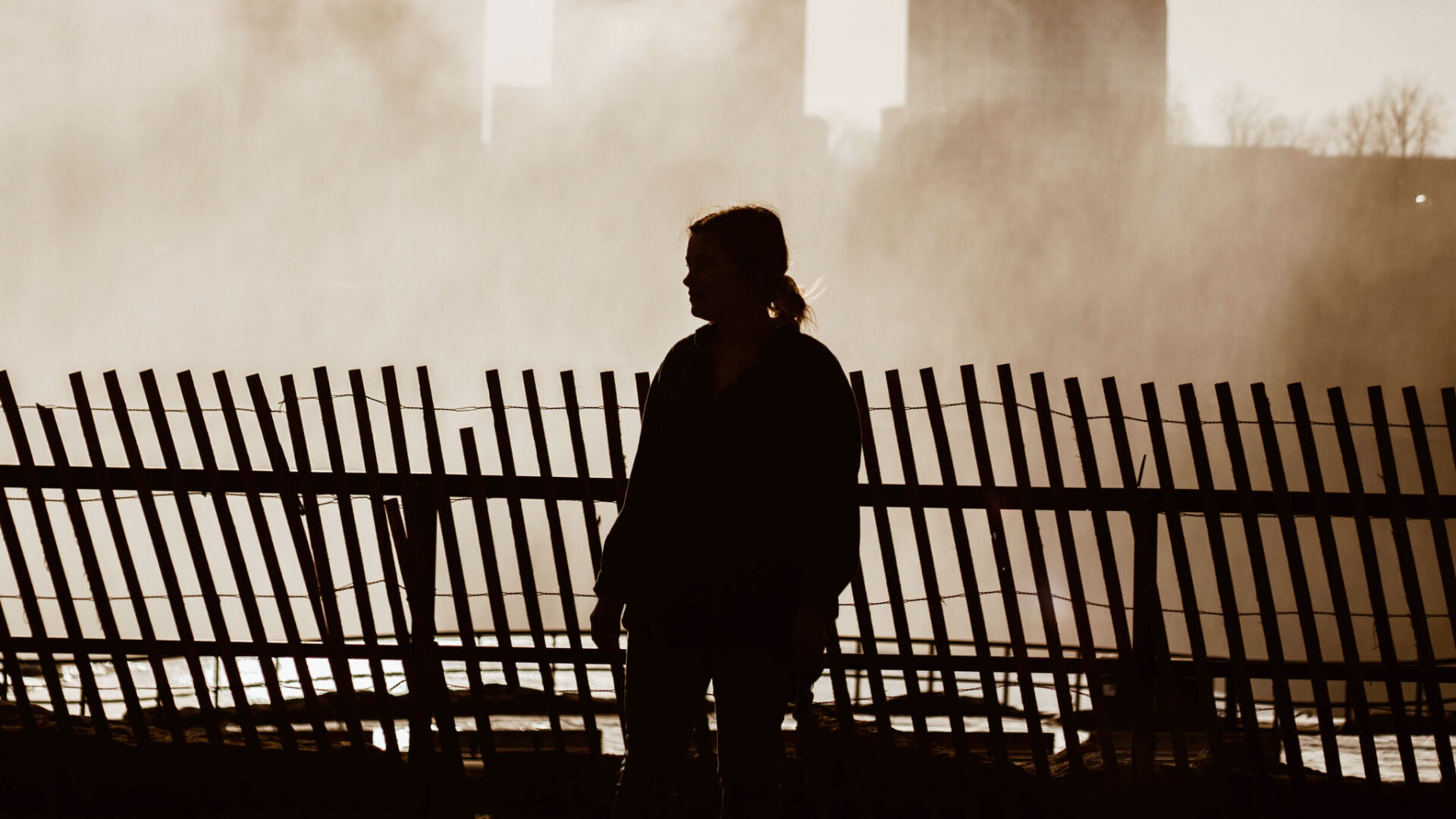“I’m exhausted,” you think as you open your laptop for another day of remote learning, another week of Zoom calls, another week of child-rearing without playdates, or all of the above. You close your eyes and take a deep breath, willing one day’s worth of energy from a well that’s long been dry. Perhaps you’ve said ‘yes’ to too many things, too many people. Or maybe you’ve only said one ‘yes’ and it’s draining your vitality one ounce at a time.
You daydream about a vacation, somewhere secluded and quiet, a week—two weeks!—without anyone asking me for anything: “Then I’d feel rested.” But where in your schedule would a vacation fit? Who would take care of your responsibilities? And what about the cost? The type of vacation you’d need to relieve the exhaustion your feeling wouldn’t be cheap: who’s going to pay for your rest? And what in the world will you do if you don’t get it soon?
Covid has further blurred the lines, cutting out the physical thresholds between home and workplace. Without the commute, where is our decompression? What is the difference between work and rest when it’s all happening in the same room?
Christian, there is good news for us. The life of rest is not reserved for the rich or the childless. God, in his great mercy, has given us all that we need to take a true rest in him right now. The door stands open to us, all we must do is walk through.
God’s Vision of Rest
Thus the heavens and the earth were completed in all their vast array. By the seventh day God had finished the work he had been doing; so on the seventh day he rested from all his work. Then God blessed the seventh day and made it holy, because on it he rested from all the work of creating that he had done.
Genesis 2:1-2 NIV
The first biblical character to rest was neither man nor woman, but God himself after creating all of the known world. But God’s choice to take a rest was not driven by a scarcity of creative or energetic resources, as ours may be. His break in creative effort was driven by divine understanding of what is best and a desire to display a fundamental element of ‘the good life’ found exclusively in God’s very good plan. His rhythmic framework for this good life holds space for both work and rest; the balance so important that it was set smack in the middle of God’s framework for ‘the good life’ as seen in the Ten Commandments (Exodus 20:8).
We see this rhythm repeated throughout the Scriptures, in the natural world, and in Jesus’ faithful observance of the sabbath, deep and intentional work, and how he sits at rest today (Hebrews 8:1) with his work of salvation completed.
“Summer and winter and springtime and harvest / Sun, moon and stars in their courses above / Join with all nature in manifold witness / To thy great faithfulness, mercy, and love.”
Thomas Chisholm, “Great Is Thy Faithfulness”
Through Jesus’ life, we learn that balancing work and rest is not a matter of convenience, but one of willing obedience to what God says is best. Unwillingness to submit to the invitation and command of God the Father by resting may point to a deeper issue that permeates our culture: idolatry of busyness.
The Idolatry of Busyness
What do people get for all the toil and anxious striving with which they labor under the sun? All their days their work is grief and pain; even at night their minds do not rest. This too is meaningless.
Ecclesiastes 2:22-23 NIV
American culture has a restlessness problem. Much of our restlessness stems from a surface-level fear of being perceived as lazy, and a soul-level fear that producing less might shrink our innate worth. Thus in order to remain relevant, or at least to keep up appearances, we submit to a life of constant toil fueled by anxiety. While this life is common, it is anti-biblical. The Christian life is marked by a rest in the work of someone else. This rest transforms our own work, as it flows from a space of assurance that our worth has been secured once and for all by no work of our own, not from an ever-dwindling store of adrenaline and anxiety.
For it is by grace you have been saved, through faith—and this is not from yourselves, it is the gift of God—not by works, so that no one can boast.
Ephesians 2:8-9 NIV
So how do we fight this idol? What does it look like to swim against the current of hectic laziness or total burnout? The fight does not come by crossing the last item off our to-do list, it is in a posture of submission to God’s will.
The Posture of Rest: Submission
Come to me, all you who are weary and burdened, and I will give you rest. Take my yoke upon you and learn from me, for I am gentle and humble in heart, and you will find rest for your souls. For my yoke is easy and my burden is light.
Matthew 11:28-30 NIV
Our culture of restlessness preaches that our worth is found in what we do. Thus, to keep our standing as worthy of love, protection, and provision we submit to its law—produce as much as possible, no matter the personal cost.
But the gospel of truth preaches something entirely different. According to the gospel of Jesus says, our eternal worth is secure according to his work. And this work is already complete. By his work we are guaranteed love, protection, and provision. Submitting to this gospel, though, requires that we submit to God’s vision of the good life. And part of that is taking up his rhythm of work and rest.
Jesus invites us into this rhythm in Matthew 11. A yoke is a farming tool used to spread the burden of labor across the back of two animals, making the burden easier to bear. It may come as a surprise that in his iconic discourse, Jesus doesn’t offer a vacation to the weary and burdened: he offers a new way of working, one that is directly in step with Christ himself.
The rest Jesus is referring to begins and ends in the deepest plane of human existence: the soul. Through Christ’s soul-first lens, we infer that much of our anxious toil stems not from hectic deadlines or mere to-do lists, but from a deep spiritual unrest.
Christ’s way is laced in truth and awareness of human limitations. To take Jesus’ yoke upon our shoulders is to admit those limitations ourselves. We are not infinite, our wells of energy and creativity can and will run dry without a break. Not only that, we are willing followers of God who seek to obey his commands because we believe they are our very best option.
God has commanded us to regularly partake in deep rest. Doing otherwise is not only unwise, it is disobedient. God’s fourth commandment has been woefully rendered optional. The sabbath, while a gift, is no less serious than “You shall have no other gods before me” or “You shall not murder.” The difference in our reverence for this commandment is cultural in nature, not spiritual. Sabbath is not something to be fit into our too-busy schedule. It is a sacred habit around which we build our lives.
So how do we embody gospel rest in a culture that idolizes busyness and restlessness? How might a life constructed upon a foundation of rest actually look? Here is some good news—we already have all that we need to do so. We have been richly blessed with a rather specific framework for the rest God requires, it is called the sabbath.
The Outworking of Rest: Sabbath
“Remember the Sabbath day by keeping it holy. Six days you shall labor and do all your work, but the seventh day is a sabbath to the Lord your God. On it you shall not do any work, neither you, nor your son or daughter, nor your male or female servant, nor your animals, nor any foreigner residing in your towns. For in six days the Lord made the heavens and the earth, the sea, and all that is in them, but he rested on the seventh day. Therefore the Lord blessed the Sabbath day and made it holy.”
Exodus 20:8-11
If you keep your feet from breaking the Sabbath
Isaiah 58:13-14 NIV
and from doing as you please on my holy day,
if you call the Sabbath a delight
and the LORD’s holy day honorable,
and if you honor it by not going your own way
and not doing as you please or speaking idle words,
then you will find your joy in the LORD,
and I will cause you to ride in triumph on the heights of the land
and to feast on the inheritance of your father Jacob.”
For the mouth of the LORD has spoken.
There’s a farming technique called fallowing in which fertile land is intentionally left without sowing. The purpose of fallowing is to give the land time to recover the vital properties required to produce a harvest. Though it decreases the crop for a season, it saves the land from being completely depleted by constant production.
Sabbath is the soul’s fallow season. As put forth in the Scriptures, the sabbath is a 24-hour period during which a believer willingly ceases in production to engage in worship, rest, and delight. Weekly observation of the sabbath allows us time to restore that which is vital to continue on in our God-given work; the opportunity to detach our worth from our busyness, sort through our to-do lists, and determine what is actually important for us to accomplish in the days ahead and lay aside the busy work.
Since observing the sabbath is profoundly counter-cultural, it will take an extra ounce of self-discipline to remain committed to the practice. Let’s consider what it will take to reconstruct our lives around God’s good gift of Sabbath.
Plan For Rest. I once heard a teacher suggest that Christians should make a habit of resting for one hour a day, one day a week, and one week a year. In order to put this type of rhythmic rest into practice will require us to set firm boundaries and get comfortable saying no. These boundaries will serve us well and will become easier to enforce over time.
Observe the Sabbath. Dr. Timothy Keller once said that a proper sabbath includes three essential elements: worship, delight, and rest. Worship of God can take any number of forms on the sabbath: from gathering with a local body of believers to silent prayer in the dark hours of the morning. Worship is the heart of sabbath and requires our full attention, so we do well to go into the sabbath with a plan for what form our worship might take. Delight during the sabbath is an individual matter. Perhaps a well-cooked meal stirs your affection for the God of taste. Or maybe listening to a well-loved album reminds you of the God who created sound. Make time to immerse yourself in the magisterial beauty of God, however it may look for you. And, of course, rest. Sleep in, take a nap, go to bed early. And take care to rest emotionally by limiting interactions and activities that cause unrest (be it spiritual, emotional, or physical) that space may remain to receive the deep restoration of God.
Expect Resistance. Adopting the weekly practice of the sabbath may be surprisingly difficult for western Christians, as we’re immersed in a society that equates productivity to personal worth. Reorganizing our lives to reflect a deep inward rest by engaging in counter-cultural outward rest will take a profound amount of self-control and determination. Thus, the practice must be soaked in prayer. Pray going into your sabbath that God would be with you as you lay down your toil and enjoy his good gift; pray throughout your sabbath that you’d not fall into the temptation to “just get something done”; pray after your sabbath in gratitude that you’ll have another week to figure it out.
The life of gospel rest is yours, Christian. It is yours today, just as you are, just where you are. May grace and peace be with you.
Image credit: Jared Crouse
Katie Noble is the founder and lead writer of Goodness Co. and the author of Pray Like This: Christ’s Guide to Praying the Scriptures, a devotional on the Lord’s Prayer published by Hosanna Revival. She lives and writes in central Ohio with her husband, David, and two sons.






